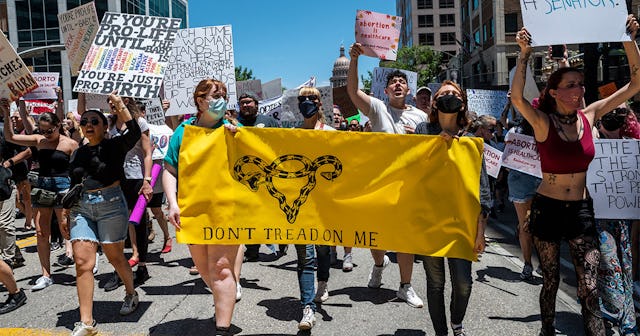How The FACE Act––A 1994 Federal Law––Could Challenge The Texas Anti-Abortion Law

Chances are you’ve heard about the latest attempt to create a real life Handmaid’s Tale in the good ol’ U.S. of A. Last week, Texas’s ultra-restrictive abortion ban took effect. Like similar “heartbeat” laws that are working their way through the courts in other states, the bans abortion if a heartbeat is detected. As if this weren’t bad enough, knowing that the law could face challenges to its constitutionality, the completely sinister lawmakers who passed this disgusting legislation included this little gem – state officials aren’t the ones who can enforce the abortion ban, but rather private citizens can sue anyone who has an abortion or assists with one.
It creates a vigilante system by deputizing ordinary citizens – regardless of whether they have any connection to the patient or healthcare provider involved – to enforce the ban, dangling a prize of $10,000 if they are successful. This means anti-abortion activists can sue clinics, patients and anyone who accompanies them to the procedure, Uber drivers who give them a ride, and health care providers who perform or assist with the procedure. If your head is ready to explode in a fit of rage, you aren’t alone.
There are about a million things wrong with Texas’s anti-abortion law. Not only is it an unconscionable restriction on a woman’s right to make choices regarding her body and medical care, but there are serious procedural problems with it as well – issues that will likely be addressed in legal challenges to its constitutionality. For instance, how do the plaintiffs even have standing to bring these claims? What about the law’s lack of sanctions for frivolous lawsuits? And how about the incentive to bring lawsuits against anyone and everyone in the hopes that one of the lawsuits sticks?
The law sent health clinics and their patients panicking. According to CNN, clinics across Texas have stopped offering or performing abortions after six weeks – the time when a heartbeat is usually detected – or they’ve closed their doors completely.
To help the situation on the ground at clinics, the Justice Department has said that the law may also violate the Freedom of Access to Clinic Entrances Act, or FACE, which is a 1994 federal law that guarantees access to the entrances of clinics that offer reproductive health services, including abortions. The law prohibits any actions that threaten, obstruct, or injure a person seeking access to the clinic or that cause damage to the clinic’s property. Violations are punishable by hefty fines or imprisonment.
“We will not tolerate violence against those seeking to obtain or provide reproductive health services,” Attorney General Merrick Garland said in a statement on September 6. “The department will provide support from federal law enforcement when an abortion clinic or reproductive health center is under attack.”
Garland specifically referred to the FACE Act as a means to “protect the constitutional rights of women and other persons.” As reported by The New York Times, Garland’s statement appears to be the first step taken by the Biden administration to protect abortion rights.
“I think he was trying to send a signal to people on the ground that they need to physically leave clinics alone. I think there’s a concern that, from reports on the ground, activists are hanging out at the clinics and they’re watching who goes in and out,” Howard M. Wasserman, a law professor at Florida International University in Miami, told The New York Times. “There may be some intimidation going on, and so FACE would be a way to stop that.”
Texas’s Senate Bill 8 was signed by Texas Gov. Greg Abbott in May 2021, and it took effect on September 1. The Supreme Court completely shirked its responsibilities when it decided not to block the law, in a 5-to-4 vote, despite the prevailing precedent of Roe v. Wade, the longstanding Supreme Court decision that established a constitutional right to abortion. Although the Court said that its decision was not a ruling on the constitutionality of the case, but rather a ruling on whether it could block the law from becoming effective, the damage has been done. Even if the law is eventually deemed unconstitutional (which I believe will be the case, though my faith in “justice” is waning rapidly), what happens in the meantime? Chaos. Fear. Panic. Unsafe and potentially deadly abortions. Frivolous lawsuits. And skyrocketing insurance premiums for health care clinics.
Relying on the FACE Act alone won’t be enough. It might help the situation on the ground, but it won’t address the underlying scope of the law and the ability for any citizen to sue an abortion clinic or person who assists with an abortion. We need a wholesale affirmation of Roe v. Wade and a complete reversal of Texas’s Senate Bill 8.
It’s 2021 and I seriously cannot believe that we are still fighting for this.